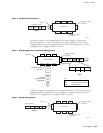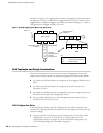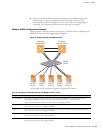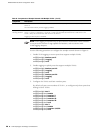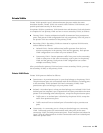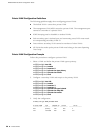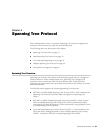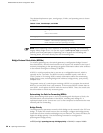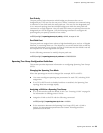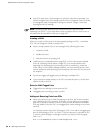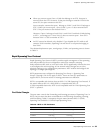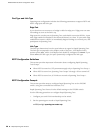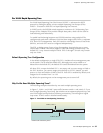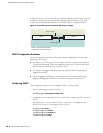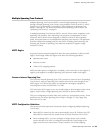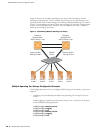Spanning Tree Overview 33
Chapter 3: Spanning Tree Protocol
Port Priority
The port priority helps determine which bridge port becomes the root or
designated port. The case for the root port is when 2 switches are connected using
a minimum of two links with the same path-cost. The case for the designated port
is in a network topology that has multiple bridge ports with the same path-cost
connected to a single segment—the port with the lowest port priority becomes the
designated port for the segment. Use the following command to configure the
spanning-tree port priority (Interface Port mode):
ex2500(config-if)# spanning-tree stp 1 priority <0-240, in steps of 16>
Port Path Cost
The port path cost assigns lower values to high-bandwidth ports, such as 10 Gigabit
Ethernet, to encourage their use. The objective is to use the fastest links so that the
route with the lowest cost is chosen. A value of 0 indicates that the default cost will
be computed for an auto-negotiated link speed.
Use the following command to modify the port path cost:
ex2500(config-if)# spanning-tree stp 1 path-cost <0-200000000>
Spanning Tree Group Configuration Guidelines
This section provides important information on configuring Spanning Tree Groups
(STGs):
Changing the Spanning Tree Mode
When the spanning-tree mode is changed (for example, RSTP to MSTP):
You must reconfigure spanning-tree parameters for each STG, including VLAN
assignment.
If an STG in RSTP mode is disabled and then re-enabled, the Spanning Tree
topology does not converge rapidly.
Assigning a VLAN to a Spanning Tree Group
If no VLANs exist beyond the default VLAN 1 see “Creating a VLAN” on page 34
for information on adding ports to VLANs.
Assign the VLAN to the STG with the following command:
ex2500(config-if)# spanning-tree stp 1 vlan <1-4094>
If the association between the Spanning Tree Group (STG) and a VLAN is
broken, the spanning-tree parameters are cleared. Reconfigure all the
parameters for the STG.



